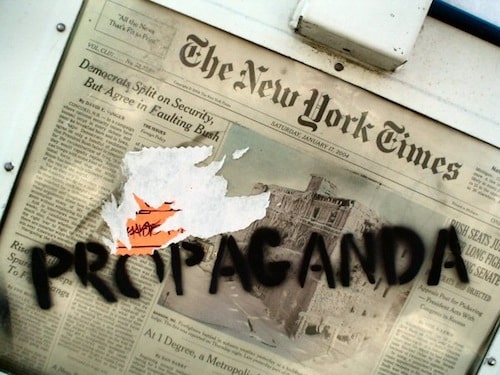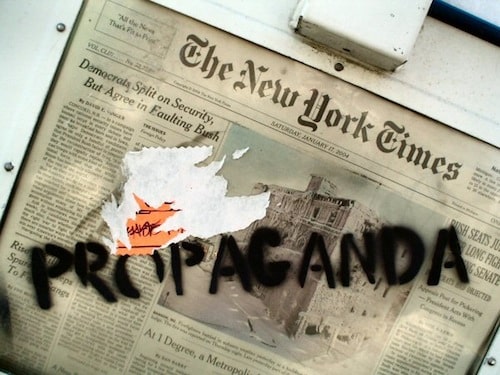The media nowadays are busy congratulating themselves for their vigorous criticism of Donald Trump. To exploit that surge of sanctimony, Hollywood producer Steven Spielberg rushed out The Post, a movie depicting an epic press battle with the Nixon administration. Critics raved over the film, which the New York Post enthusiastically labeled “journalism porn of the highest order.” Boston Public Radio station WBUR called it the “most fun you’ll ever have at a civics lesson.”Spielberg, touting his movie, claimed that “the free press is a crusader for truth,” But the media hoopla around The Post is akin to geezers boasting of having shown moments of courage when they were almost 50 years younger.
The Post is built around the Pentagon Papers, a secret study begun in 1967 analyzing where the Vietnam War had gone awry. The 7000-page tome showed that presidents and military leaders had been profoundly deceiving the American people ever since the Truman administration and that the same mistakes were being endlessly repeated. Like many policy autopsies, the report was classified as secret and completely ignored by the White House and federal agencies, which most needed to heed its lessons. New York Times editor Tom Wicker commented in 1971 that “the people who read these documents in the Times were the first to study them.”
Daniel Ellsberg, a former Pentagon official, heroically risked life in prison to smuggle the report to the media after members of Congress were too cowardly to touch it. The New York Times shattered the political sound barrier when it began courageously publishing the report despite a profusion of threats from the Nixon administration Justice Department. After a federal court slapped the Times with an injunction, the Washington Post and other newspapers published additional classified excerpts from the report.
The Post ignores the fact that U.S. government policy on Vietnam did not become more honest after the Pentagon Papers disclosure. In such cases, the government’s notion of “repenting” is merely to substitute new and often more-ludicrous falsehoods. Besides, as retired State Department whistleblower Peter van Buren noted, “The Post has no real interest in the Pentagon Papers except as a plot device, almost an excuse needed to make this movie.”
Because the Washington Post had a female publisher, Spielberg made it, rather than the Times, the star of the show. Van Buren suggested, “Spielberg might as well have costumed Meryl Streep (who played Post publisher Katherine Graham) in a pink pussy hat for the boardroom scenes.” The movie fails to mention Graham’s cozy relationship with President Lyndon Johnson. A few weeks after John F. Kennedy was assassinated, a secret tape made by the Johnson White House captured Johnson and Graham (whom he called “sweetheart”) flirting up a storm during a phone call. She later flew to his Texas ranch for a personal visit.
Spielberg’s movie portrays Post editor Ben Bradlee denouncing dishonest government officials to Graham: “The way they lied — those days have to be over.” Defense Secretary Robert McNamara, who deluged the media with falsehoods about battlefront progress, did more than anyone else (except perhaps Lyndon Johnson) to vastly increase the bloodbath for Americans and Vietnamese. McNamara’s disastrous deceits did not deter the Washington Post from appointing him to its board of directors. As Norman Solomon, author of War Made Easy: How Presidents and Pundits Keep Spinning Us to Death, recently observed, “The Washington Post was instrumental in avidly promoting the lies that made the Vietnam War possible in the first place.”
The Pentagon Papers proved that politicians and their tools will brazenly con the American public to drag the nation into unnecessary wars. But that lesson vanished into the D.C. Memory Hole — conveniently for bootlicking journalists such as Post superstar Bob Woodward. The late Robert Parry, a Washington correspondent for Newsweek in the late 1980s, declared that he saw “self-censorship because of the coziness between Post-Newsweek executives and senior national security figures.”
Post-Vietnam coziness
Perhaps the memory of winning the Pentagon Papers showdown with the feds helped make the media overconfident about their ability to resist the temptation to become political tools. New York Times columnist Flora Lewis, writing three weeks before the 9/11 attacks, commented in a review of a book on U.S. government lies on the Vietnam war, “There will probably never be a return to the discretion, really collusion, with which the media used to treat presidents, and it is just as well.” Within months of her comment, the media had broken almost all prior kowtowing records. CNN chief Walter Isaacson explained, “Especially right after 9/11 … there was a real sense that you don’t get that critical of a government that’s leading us in wartime.”
On March 17, 2003, George W. Bush justified invading Iraq by invoking UN resolutions purporting to authorize the United States “to use force in ridding Iraq of weapons of mass destruction.” A year later, he performed a skit at the Radio and Television Correspondents’ annual dinner featuring slides showing him crawling around the Oval Office peaking behind curtains as he quipped to the poohbah attendees, “Those weapons of mass destruction have got to be somewhere…. Nope, no weapons over there…. Maybe under here?” The crowd loved it and the Post headlined its report on the evening, “George Bush, Entertainer in Chief.” Greg Mitchell, the editor of Editor and Publisher, labeled the press’s reaction that night as “one of the most shameful episodes in the recent history of the American media and presidency.”
Most of the media had embedded themselves for the Iraq war long before that dinner. The Post blocked or buried pre-war articles exposing the Bush team’s shams on Iraq; their award-winning Pentagon correspondent Thomas Ricks complained, “There was an attitude among editors: ‘Look, we’re going to war; why do we even worry about all this contrary stuff?’” Instead, before the war started, the Post ran 27 editorials in favor of invasion and 140 front-page articles supporting the Bush administration’s case for attacking Saddam. The New York Times printed a barrage of false claims on WMDs while axing articles by Pulitzer Prize–winning reporter James Risen demolishing “the administration’s claims of a link between Iraq and al-Qaeda.” The New York Times also refused to publish classified documents showing pervasive illegal National Security Agency spying on Americans prior to the 2004 election, even though it had received the proof of vast wrongdoing. If theTimes had not flinched, George W. Bush might have been denied a second term.
Broadcast media were even quicker to grovel for the war effort. PBS NewsHour host Jim Lehrer explained, “It would have been difficult to have had debates [about invading Iraq]…. You’d have had to have gone against the grain.” Lehrer neglected to say exactly how kowtowing became patriotic. News anchor Katie Couric revealed in 2008 that there was pressure from “the corporations who own where we work and from the government itself to really squash any kind of dissent or any kind of questioning of” the Iraq war.
And now, Syria
Despite the role of media gullibility (or worse) in helping the Bush administration sell the Iraq war, the press showed scant skepticism about subsequent U.S. attacks abroad. The media behave at times as if government lies are dangerous only when the president is a certified bad guy — like Richard Nixon or Donald Trump. Barack Obama’s semi-sainthood minimized media criticism of his Syrian debacle — a civil war in which the United States initially armed one side (Syrian rebels who largely turned out to be terrorists) and then switched sides, a flip-flop that resulted in far more dead Syrians. But Americans have received few insights into that bellicose schizophrenia from the media. Historian Stephen Kinzer wrote in the Boston Globe, “Coverage of the Syrian war will be remembered as one of the most shameful episodes in the history of the American press.” Even in the Trump era — when the press is openly clashing with a president — bombing still provides push-button presidential redemption. Trump’s finest hour, according to much of the media, occurred in April 2017 when he attacked the Assad regime with 59 cruise missiles, raising hopes that the U.S. military would topple the Syrian government.
When Trump announced he was sending more U.S. troops to Afghanistan, the Washington Post editorial page hailed his “principled realism” — regardless of the futility of perpetuating that quagmire. At a time when Trump is saber-rattling against Iran and North Korea, the media should be vigorously challenging official claims before U.S. bombs begin falling. Instead, much of the coverage of rising tensions with foreign regimes could have been written by Pentagon flacks.
Richard Nixon’s henchman H.R. Haldeman warned Nixon that the Pentagon Papers might make people believe “you can’t trust the government; you can’t believe what they say; and you can’t rely on their judgment. And the implicit infallibility of presidents, which has been an accepted thing in America, is badly hurt by this.” Unfortunately, much of the media continue to presume that presidents are infallible — as long as they are killing enough foreigners.
One of the starkest lessons of the Pentagon Papers was that politicians and their henchmen will tell unlimited lies — and ignore stark warnings — to plunge the nation into unnecessary foreign wars. And forgotten falsehoods almost guarantee new political treachery. Politicians don’t need to provide strong evidence as long as the media continue treating them as if they were Delphic oracles. Truth delayed is truth defused because there is no way to rescind bombs that have already detonated.
Media tub-thumpers were crestfallen when The Post struck out on Academy Awards night (it was nominated for Best Picture and other categories). But that worked out well for history, since it leaves the path more open for subsequent documentaries or movies that provide more honest exposure of how wars get started and perpetuated. Future movies might even venture into the forbidden ground of media docility regarding systemic violations of human rights.
Supreme Court Justice Hugo Black, in his 1971 opinion on the New York Times’s right to publish the Pentagon Papers, declared, “Only a free and unrestrained press can effectively expose deception in government.” Unfortunately, the media often choose to trumpet official lies instead of fighting them. Permitting glorious tales from eight presidencies ago to absolve subsequent media kowtowing would be as foolish as forgetting the lessons of the original Pentagon Papers.Worshipping the media is as foolish as worshiping politicians.
Reprinted with permission from Future of Freedom Foundation.


